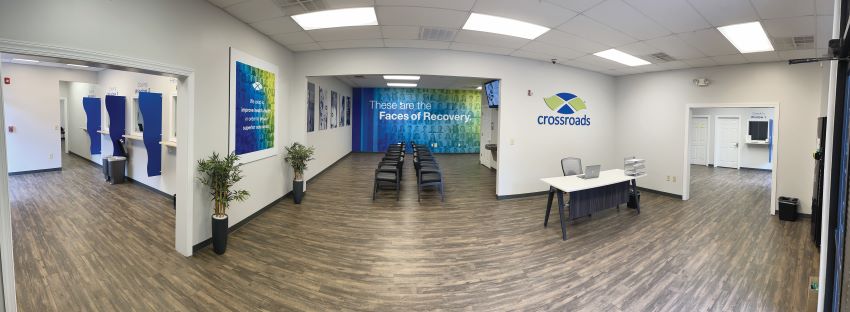
Crossroads Treatment Centers has seen a spike in patients seeking care for opioid addiction since the COVID-19 pandemic.
In the Lehigh Valley, the rate has tripled, said Brian Nash, vice president of operations for the Medication-Assisted Treatment (MAT) centers.
According to the Centers for Disease Control and Prevention, Pennsylvania had the third-highest rate of drug overdose deaths in the country in 2017. Many people at the highest risk for an overdose death have an opioid use disorder, the CDC said.
While some patients are seeking treatment for addiction to prescribed medication, Nash said many are dealing with addiction to opioids they get illegally.
Mostly, he said, people are taking Fentanyl, a synthetic opioid found on the black market that is mixed with Xylanzine, a non-opioid sedative used in veterinary practice.
“This creates a similar high to other addictive drugs but causes open wounds around the injection site,” he said. “It eats away the flesh.”
So, Crossroads is providing wound care along with addiction treatment at some of its locations. Nash said the centers in Allentown, Easton and Reading are not currently offering wound care.
“There has been a dramatic increase in Fentanyl use in the last year or so,” Nash said. “People don’t know what it is mixed with when they buy it on the street.”
At issue is when someone is injured and prescribed opioids. When they can no longer get the prescription, Nash said they often look to get their high elsewhere.
“This is not a one size fits all,” Nash said. “But once the drugs take control, people turn to Crossroads for help.”
Nash said about 60% to 70% of patients find Crossroads by word of mouth. Referrals also come from rehabilitation centers and hospitals, he said.
Crossroads focuses on MAT, Nash said. With the use of a methadone program or a suboxone program, patients are helped through their addiction.
“These drugs allow the patient to reduce cravings to get the drugs out of their system,” Nash said. “It’s about getting their life back.”
Crossroads provides care management that focuses on social determinants of health to ensure success.
“We work on housing, transportation, food, jobs, and anything else they need to get back to their lives,” he said.
Crossroads also employs Certified Recovery Specialists, people who have gone through addiction and can walk through the steps to help people recover.
“They let them know there is light at the end of the tunnel,” Nash said.
The outpatient-based program allows clients to do recovery at home with the help of counselors and Certified Recovery Specialists. The program was designed so people can continue to work and care for family while in treatment, Nash said.
There are more than 400 people being treated in the Lehigh Valley area. Nash said the 53 locations across the state are treating more than 14,000.
“This is very prevalent,” he said. “It is found in every zip code – every walk of life.”
All Crossroads centers offer InstantIntake either in-person or by phone. Nash said anyone who calls will get treatment the same day.
“It’s unique in Pennsylvania to see a provider on the first call,” he said. “You can go through the intake process, see a medical provider and a counselor all in one visit if you have a smartphone.”
Crossroads is a Centers of Excellence which were established by Gov. Tom Wolf in 2016 as a solution to the growing overdose crisis in the state, CDC said.
“This allows us to increase focus on care management while patients walk through their journey,” Nash said. “We have increased patient retention rates according to Pennsylvania numbers.”
Nash said recovery time varies from patient to patient because addiction alters the brain.
“There is a huge difference in taking medications and taking increased amounts of fentanyl,” he said, adding people with an addictive personality can face more challenges.
“We define recovery as reclaiming life before the addiction took over,” he said. “Our goal is to do right by the patient, so we stay with them through the whole process.”
